Berlin has witnessed myriads of events that shaped global politics. One such event was the 1884-1885 Berlin Congo Conference which subdivided Africa amongst colonialists (i). China often strategically invokes Western colonialism within its juxtapositional diplomatic memory politics to remind its Global South counterparts that while the West acted colonially – including colonising China – China is interested in cooperation, friendship, trade and development such as the 2013-launched Belt and Road Initiative (BRI), that is, the New Silk Roads (ii). It is worth paying attention to historical events that laid the formative foundation of our current modernity that includes implementation of the BRI. At the height of colonialism, after the First World War, African migrants from Germany’s former ‘lost’ colonies as well as Asian and Arab migrants from other territories under colonial rule by diverse colonial powers moved to Berlin, thus transforming it into a postcolonial metropolis. They became politically active and formed diverse international anti-colonial resistance solidarity networks against racism, colonialism and imperialism in pursuit of independence for their far-off homelands. Dekoloniale, an organization that highlights colonial memory cultures in Berlin, organized the 14-17 September 2023 Dekoloniale Festival with a focus on transnational Afro-Asian connective memories in Berlin, Germany and Bandung, Indonesia. An exhibition, a walking tour and an international conference concretized transnational Afro-Asian memory spaces in Berlin.
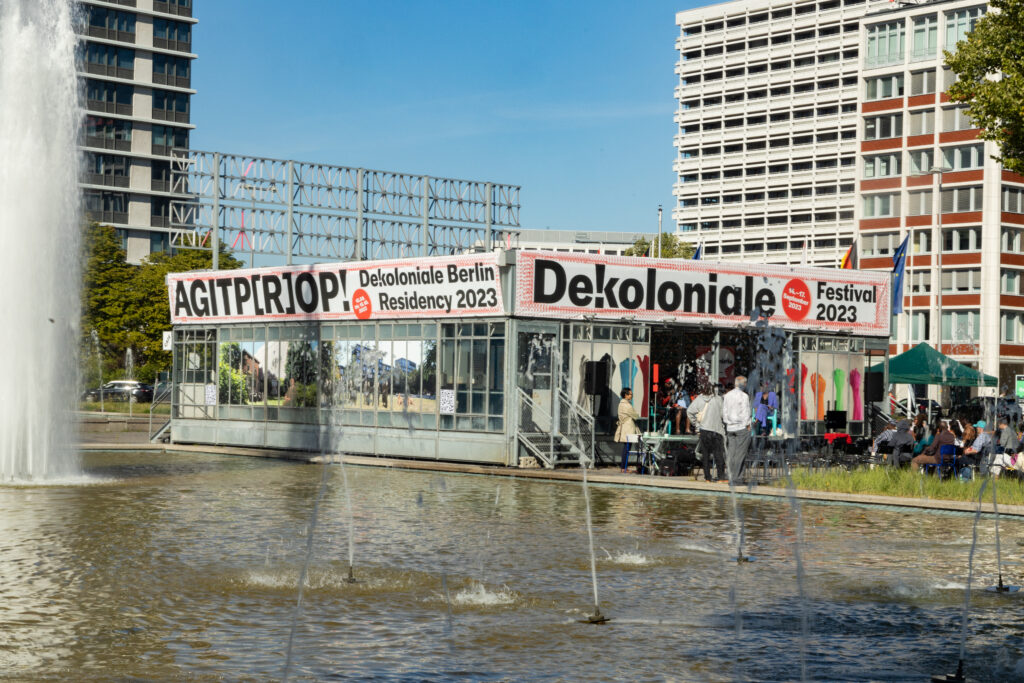
©Dekoloniale Festival 2023_Damian Charles
The opening event of the Dekoloniale Festival 2023 was a fascinating and very instructive exhibition titled ‘Stand in Solidarity! Black Resistance and Global Anticolonialism in Berlin 1919-1933’, which is hosted at the Museum Charlottenburg-Wilmersdorf in der Villa Oppenheim. The biographies of over thirty personalities that were involved in the Afro-Asian anticolonial networks in Berlin shall remain on display until 17 March 2024. The exhibition was curated by Laura Frey, Christian Kopp, Bebero Lehmann, Mirja Memmen and Janik Wetzel.
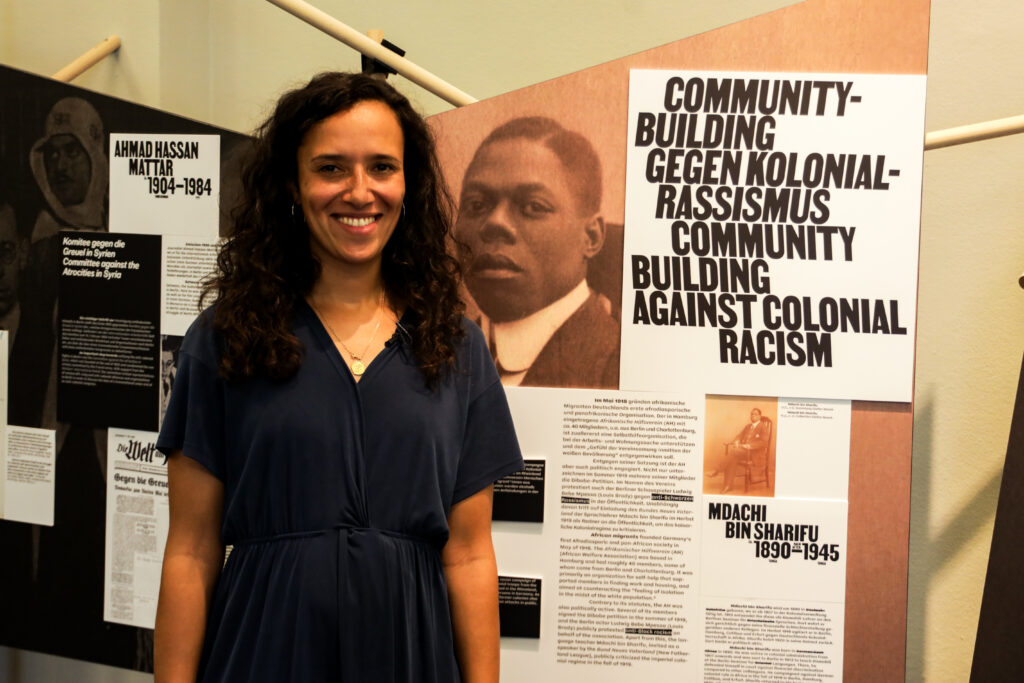
Bebero Lehmann, one of the exhibition curators.
©Dekoloniale Festival 2023_Damian Charles
The meticulously planned walking tour organized by B’net Rahal took the approximately 80 participants across Berlin where we visited memory places that memorialize the presence of Africans and Asians in the 1920s during the Weimar Republic. Several scholars who have published about these Afro-Asian public memory spaces gave brief lectures about each memory place during stops that lasted about 15 to 20 minutes. They narrated captivating and tragic facets of biographies of Asians and Africans, their anti-colonial activities in Berlin, how they lived in Berlin and beyond, how Germany’s then Weimar Republic viewed their presence, how the Weimar Republic recruited some of them to help Germany act against fellow colonialists/imperialists abroad, their resilient transnational connections to the homelands they came from in Asia and Africa and how they influenced politics after returning to their homelands.
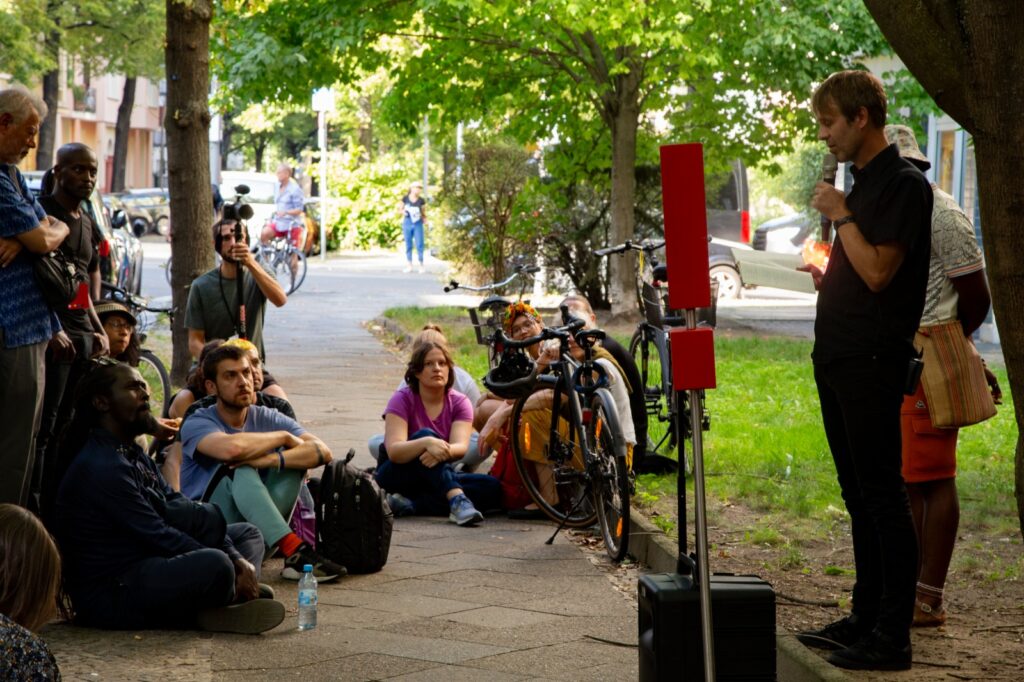
Fredrik Petersson's walking tour lecture.
©Dekoloniale Festival 2023_Damian Charles
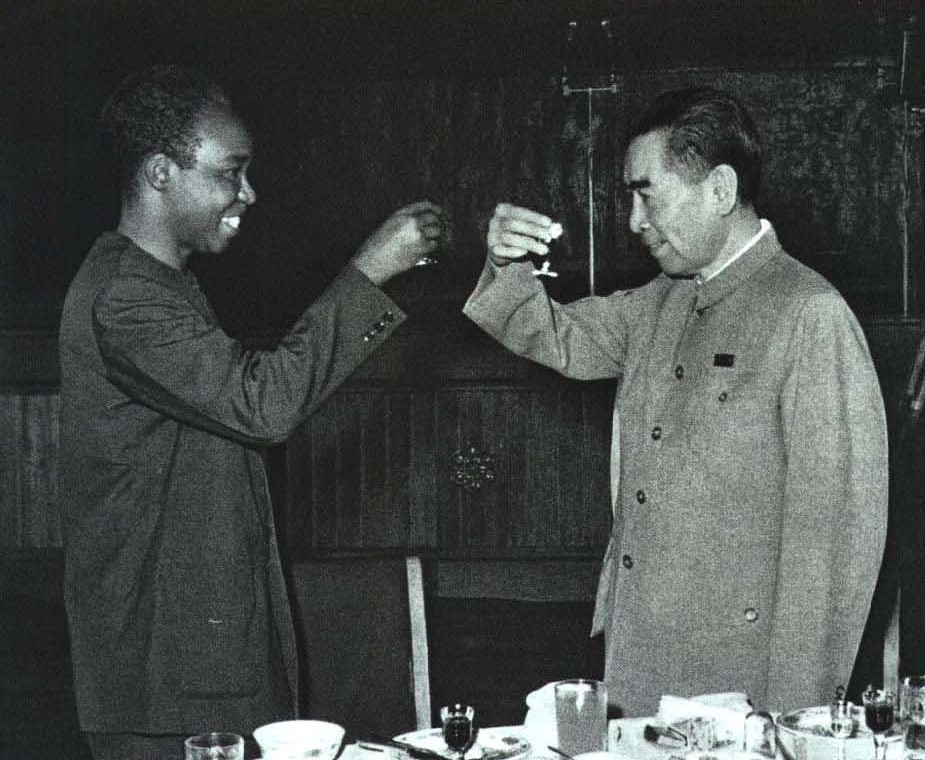
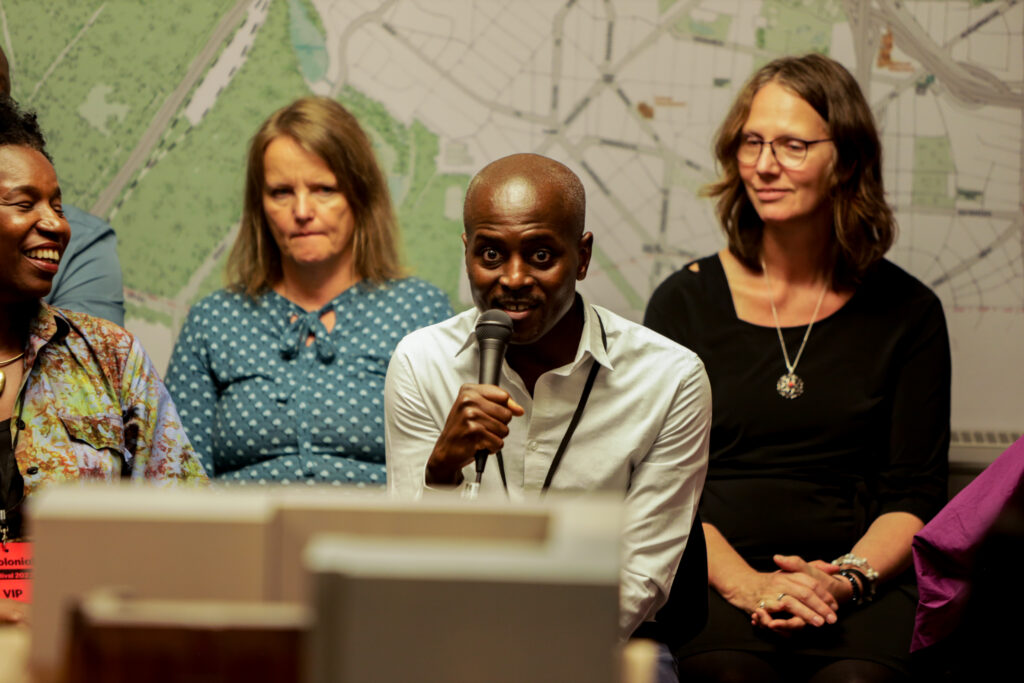
Dominique Eyidi in Berlin.
©Dekoloniale Festival 2023_Damian Charles
Inspired by the historic Bandung Conference in 1955, the 2023 Dekoloniale Conference in Berlin was titled ‘Bandung Revis[it]ed’ and it brought together experts of African and Asian descent who exchanged views on key issues regarding transnational solidarity. The conference had five panels titled: Art, History and Culture; Economy and Ecology; Epistemology and Cosmology; Intersectionalities; Solidarity and Radical Justice. Each panel received a guiding question that it focussed on. Several members of our De:Link // Re:Link research consortium were invited to participate in the Dekoloniale Festival. Nadja Ofuatey-Alazard from Dekoloniale conceptualized the conference together with John Njenga Karugia. The conference was chaired by three scholars: Anne Adams, John Njenga Karugia and Christopher J. Lee. Our De:Link // Re:Link Research fellow Adams Bodomo participated in the panel on epistemology and Cosmology and our Research Fellow Ibrahima Niang participated in the festival’s events.
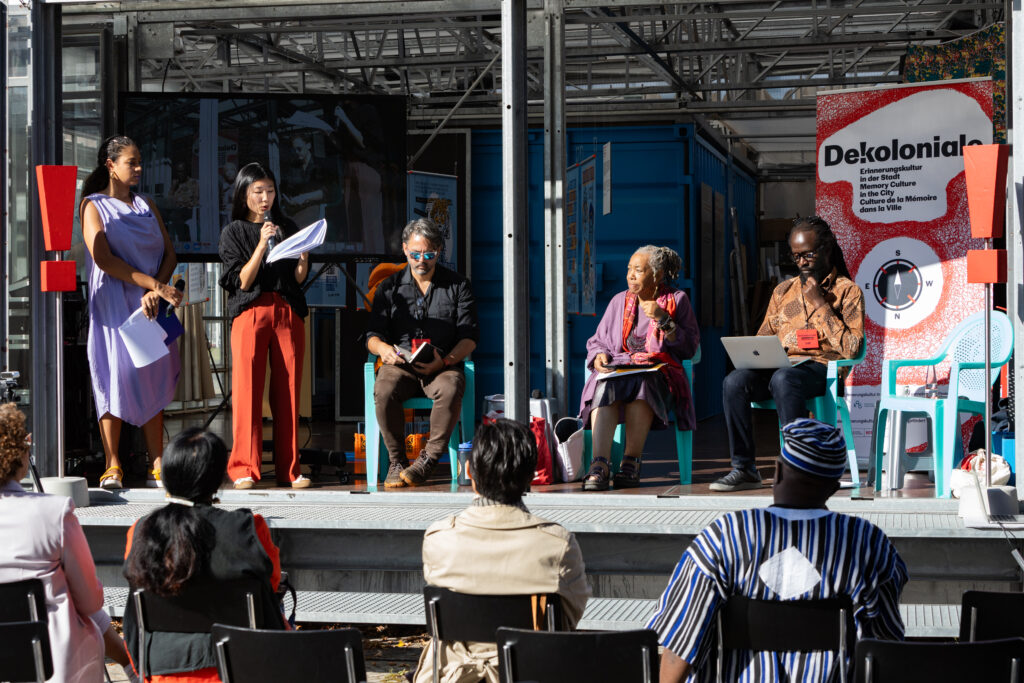
©Dekoloniale Festival 2023_Damian Charles
The 2023 Dekoloniale Festival Conference mirrored the 1955 Bandung Conference which came up with the “Ten Principles of Bandung”. The panelists at the 2023 Dekoloniale Festival came up with ten demands that they deemed vital after a full day of dialogues and debates amongst panelists and attendees of the conference. These are presented below with the corresponding names of the panelists involved and the panel within which these demands emanated.
Panel 1 Solidarity and Radical Justice (Kehinde Andrews, Saraya Gomis, Mwazulu Diyabanza, and Su-Ran Sichling)
1. Establish new educational institutions, content and educational formats whose curricula incorporate new themes, new media, social media, conferences, symposiums in schools and universities.
2. Build alliances of solidarity that reflect our shared visions of restitution of cultural artifacts that belong to Africa, Asia and Oceania; Solidarity for the common topic of migration; Alliances for land ownership that incorporates Indigenous peoples.
Panel 2 Art, History and Culture (N’Goné Fall, Hou Hanru, Miriam Ibrahim, Rajesh Parameswaran)
3. Organize our collective power to strategize on how to build topic-specific collectives to address and achieve specific common goals such as: to (re)write our histories; to represent our common issues in different media (television, cinema, theater, museums, magazines, newspapers, literature, politics etc.) in order to challenge our current contexts (and to form a different future).
4. Find new means to create our own spaces and to restructure existing spaces to share and build knowledge for diverse BIPOC perspectives.
Panel 3 Intersectionalities (Marlize André, Ragil Huda, Makda Isak, Dr. Christine Vogt-William)
5. Insist on formulation and implementation of comprehensive anti-discrimination laws that explicitly recognize the intersectionality of our identities as people of African and Asian descent and as Black Queer individuals. Such laws must provide clear and concise language for protection against discrimination regarding all aspects of life, including employment, housing, healthcare, education, and public services. This framework will help reduce oppression by ensuring a legal recourse for those who experience discrimination and by promoting a culture of inclusivity and respect.
6. Demand an accessible and inclusive legal system that recognizes the unique challenges faced by people of African and Asian descent and Black Queer individuals globally. This includes specialized training for legal professionals on issues related to race, gender identity, and discrimination. We insist on affordable and efficient legal aid services for marginalized individuals, ensuring that access to justice is not hindered by financial constraints. Empowering our people to utilize and apply this framework involves raising awareness about legal rights, providing culturally competent legal support, and advocating for equitable representation within the legal system.
Panel 4 Economy and Ecology (Aouefa Amoussouvi, Dr. Tao Leigh Goffe, Anna Hankings-Evans, Jomo Kwame Sundaram)
7. Demand decentralized autonomous banking and governance by challenging existing financial knowledge, models and structures such as the World Bank, Stock Market and intellectual property rights.
8. Demand community-led decision making regarding the protection of land and natural resources through a definition of ‘community’ that includes minority and nomadic groups within the leadership.
Panel 5 Cosmology and Epistemology (Adams Bodomo, Phinith Chanthalangsy, Aicha Diallo, and Mala Pandurang)
9. Encourage and allow our communities to learn their indigenous, mother tongues, and heritage languages, so that they open up and diversify their worldviews. to rethink the cosmos and the knowledge systems that determine our thoughts and acts.
10. Rethink our education model for the learning and unlearning about our complex and diverse realities, using the social and human sciences and pluridisciplinarity as key tools, in order to elaborate and open up a new cosmology and epistemology.
The following publications contain further information about Afro-Asian Memory in Berlin.
Below are further impressions of the 2023 Dekoloniale Festival.
All images below ©Dekoloniale Festival 2023_Damian Charles
References
(ii) Enter the Dragon: Xi Jinping’s opening address to B&R forum, Xinhua
(iii) ‘Auf den Spuren chinesischer Revolutionäre der ersten Stunde in Deutschland’, CRI, 2 July 2021
(vii) Image of Tanzania’s President Julius Nyerere and China’s Prime Minister Zhou Enlai
(viii) Stolperstein-Verlegung für Benedikt Gambé und Charlotte Rettig
